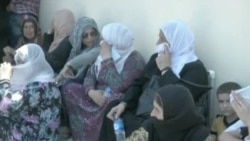WASHINGTON —
Nearly 3 million people have fled Syria since the civil war there began, and more are leaving every day. Most of them cross into neighboring Turkey, Jordan and Lebanon, where they live in sprawling tent cities and depend primarily on the help of international aid. Humanitarian groups are warning that as the number of refugees grows, funds to provide for their basic necessities are running short.
World leaders meeting this week at the United Nations General Assembly in New York will focus much of their discussion on how to end the conflict in Syria as fighting continues across the embattled country, filling local hospitals beyond capacity.
The conflict has left about 100,000 dead and the toll is growing daily, as is the number of refugees fleeing the violence. Of those who make it across the border, many are injured, disabled, sick and traumatized by the loss of relatives, homes and the life they knew.
A group of 14 humanitarian organizations called on the United Nations Monday to increase its financial support to refugees to meet the immediate and long-term needs of displaced Syrians.
Many are concerned about the future of young children, many of who are growing up idle and deprived of basic necessities in refugee camps.
U.N. Special Envoy for Global Education, former British Prime Minister Gordon Brown, announced a plan on Monday to educate 400,000 Syrian children in Lebanon. He has received $1 million from the web campaign group Avaaz to start the project.
"We think we can raise this money by persuading different organizations that this is a practical, deliverable plan that can be implemented quickly. And instead of 400,000 Syrian children doing nothing, unemployed, perhaps becoming unemployable, a lost generation, a wasted generation, childhood destroyed, we can actually show that in the next few months, these 400,000 can get the opportunities that they so richly deserve,” said Brown.
On Monday in New York, Brown further called on donor countries to provide $175 million for the project. The project envisions eventually employing former Syrian teachers to teach classes held in double or triple shifts in the Lebanese schools. The children would also get meals as part of the program.
Syrian student Farah Haddad, who is attending college in the United States, joined the campaign.
"To pursue an education is to imagine a future in which I can work with others to be the collaborative brokers of our mutual fate. Therefore, access to proper education must be understood by all parties involved in the Syrian question as a basic right for the Syrian children, indeed all children,'' said Haddad.
Gordon Brown has also enlisted support from the Pakistani teenager Malala Yousafzai. Yousafzai, now 16, was shot in the head and neck a year ago by Taliban militants for campaigning for girls' education in Pakistan. She survived the assassination attempt and recovered after surgeries and extensive treatment in Britain.
World leaders meeting this week at the United Nations General Assembly in New York will focus much of their discussion on how to end the conflict in Syria as fighting continues across the embattled country, filling local hospitals beyond capacity.
The conflict has left about 100,000 dead and the toll is growing daily, as is the number of refugees fleeing the violence. Of those who make it across the border, many are injured, disabled, sick and traumatized by the loss of relatives, homes and the life they knew.
A group of 14 humanitarian organizations called on the United Nations Monday to increase its financial support to refugees to meet the immediate and long-term needs of displaced Syrians.
Many are concerned about the future of young children, many of who are growing up idle and deprived of basic necessities in refugee camps.
U.N. Special Envoy for Global Education, former British Prime Minister Gordon Brown, announced a plan on Monday to educate 400,000 Syrian children in Lebanon. He has received $1 million from the web campaign group Avaaz to start the project.
"We think we can raise this money by persuading different organizations that this is a practical, deliverable plan that can be implemented quickly. And instead of 400,000 Syrian children doing nothing, unemployed, perhaps becoming unemployable, a lost generation, a wasted generation, childhood destroyed, we can actually show that in the next few months, these 400,000 can get the opportunities that they so richly deserve,” said Brown.
On Monday in New York, Brown further called on donor countries to provide $175 million for the project. The project envisions eventually employing former Syrian teachers to teach classes held in double or triple shifts in the Lebanese schools. The children would also get meals as part of the program.
Syrian student Farah Haddad, who is attending college in the United States, joined the campaign.
"To pursue an education is to imagine a future in which I can work with others to be the collaborative brokers of our mutual fate. Therefore, access to proper education must be understood by all parties involved in the Syrian question as a basic right for the Syrian children, indeed all children,'' said Haddad.
Gordon Brown has also enlisted support from the Pakistani teenager Malala Yousafzai. Yousafzai, now 16, was shot in the head and neck a year ago by Taliban militants for campaigning for girls' education in Pakistan. She survived the assassination attempt and recovered after surgeries and extensive treatment in Britain.







